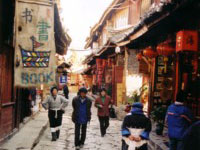Gender in China - ARTS2455
Faculty: Faculty of Arts and Social Sciences
School: School of Humanities and Languages
Course Outline: School of Humanities & Languages
Campus: Sydney
Career: Undergraduate
Units of Credit: 6
EFTSL: 0.12500 (more info)
Indicative Contact Hours per Week: 3
Enrolment Requirements:
Prerequisite: 30 units of credit at Level 1; or 24 units of credit and enrolment in a Chinese Studies extended minor in Arts/Education (4053) or a Women's & Gender Studies minor in Arts/Law (4782)
CSS Contribution Charge: 1 (more info)
Tuition Fee: See Tuition Fee Schedule
Further Information: See Class Timetable
Available for General Education: Yes (more info)
View course information for previous years.
Description
Subject Area: Chinese Studies
This course can also be studied in the following specialisations: Asian Studies, Women's and Gender Studies
This course explores the dramatic changes to gender and sexuality norms experienced by people living in China or operating in the Sinophone world. The course examines the transformation in these realms from imperial times through to the current era. It shows the ongoing tension between popular ideas about ‘tradition’ and ‘modernity’ as gender and sexuality norms and practices have changed over time. It examines interventions by China’s various governments and legal systems and campaigns by activists and reformers to change the status quo as well as the use of sex and gender by creative artists, writers and advertisers. You will learn about phenomena such as: progress towards sex equality, tensions between individual desires and family pressure, LBGTI culture and rights, socialist challenges to tradition, Chinese masculinities and femininities in local and global contexts, diversity in gender and sexuality norms among China’s non-Han ethnicities and different social classes, current challenges in gender and sexuality norms in relation to phenomenon like family formation, employment, political participation, sporting and cultural expression.
The course draws upon a diverse range of texts—audio-visual, internet, film, literature, official documents, newspapers and magazines, posters, art and performance. It is grounded in current theories of gender and sexuality operating internationally and in China. Proficiency in Chinese language is not required.










